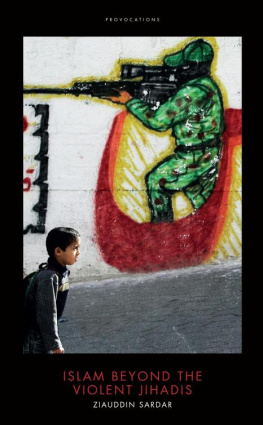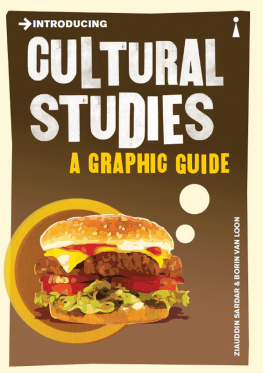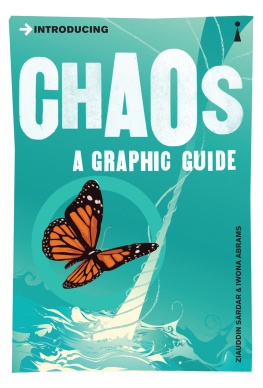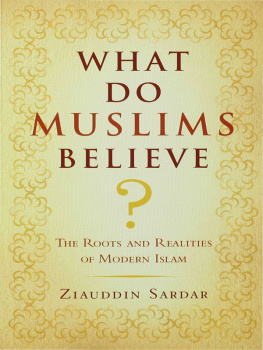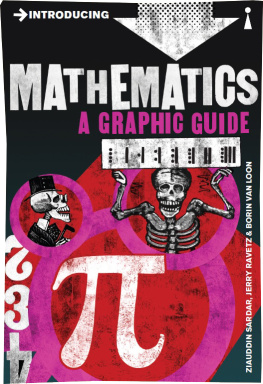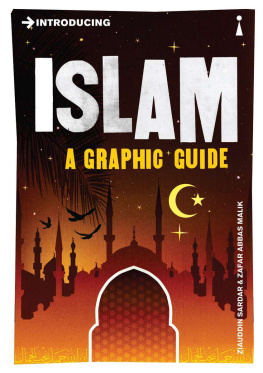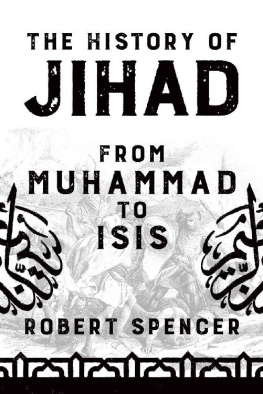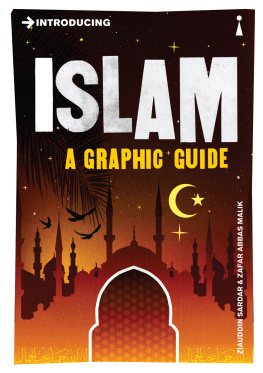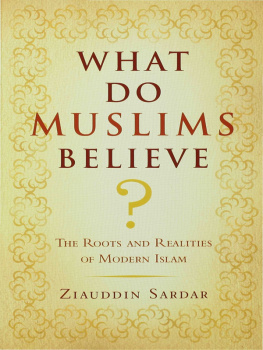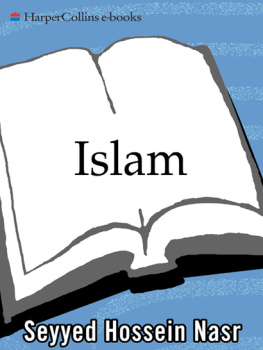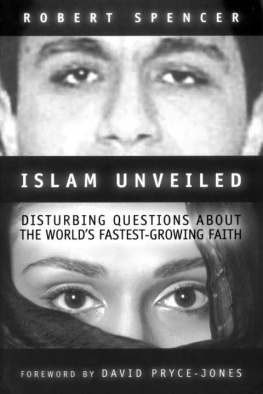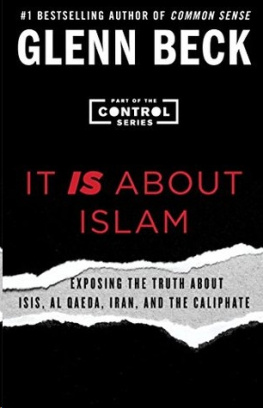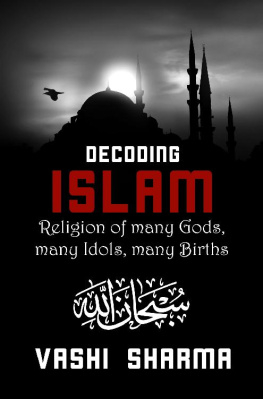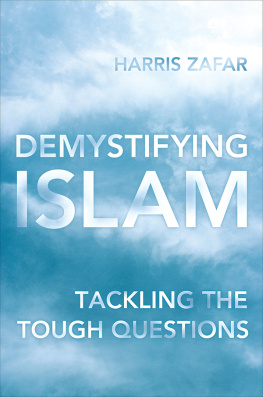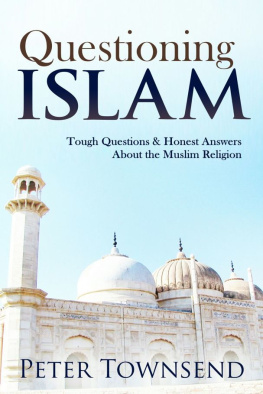ADAB: literally, etiquette; more specifically the etiquette of being human. The literary and philosophical movement of classical Islam that established liberal humanism between the eighth and the thirteenth centuries.
DEOBANDI: an adherent of the revivalist movement that emerged from the Deoband seminary in India during the eighteenth century. The Deobandis are Sunni Muslims, puritan and close cousins of the Wahhabis.
HADITH: sayings or traditions of the Prophet Muhammad.
IJMA: literally, agreeing upon, consensus of the community in general, and (in recent history) the religious scholars in particular.
IJTIHAD: systematic original thinking; exerting oneself to the utmost degree to reach comprehension and form a rational opinion based on evidence.
ILM: knowledge in all forms, and distributive knowledge in particular, incorporating the notions of wisdom and justice. In contemporary times, it has been reduced to obscurantist religious knowledge.
ISLAMIC ORTHODOXY: an amalgam of Sunni and Shia Muslims who follow the strict theological and legal interpretations of classical theologians of eighth and ninth centuries and believe that these interpretations cannot be changed and that the Shariah is divine.
JIHAD: literally, striving. Any earnest striving in the way of God, involving personal, financial, intellectual or physical effort, for righteousness and against oppression or wrongdoing.
KHARJITES: a seventh-century fanatical and murderous sect.
MUTAZILA: the school of Islamic theology based on reason and rational thought that flourished from the eighth to the thirteenth centuries. The Mutazila laid the foundations of Islamic philosophy, established the movement of liberal humanism (adab) in Islam, and produced some of the greatest thinkers of civilisation (as we and others know it).
SAHIH AL-BUKHARI: the foremost authentic collection of hadith in Sunni Islam, compiled by the Persian scholar Muhammad al-Bukhari (810870), during the ninth century.
SAHIH MUSLIM: the second most important collection of hadith in Sunni Islam, compiled by the Persian scholar Muslim ibn al-Hajjaj (815875), during the ninth century.
SALAFI: member of an ultra-conservative, fanatical movement in Sunni Islam based on the doctrine that the example of Prophet Muhammad and his earliest followers the salafs, or pious forefathers should be followed and imitated totally and without question. Those who do not are heretic at best and infidels to boot at worse.
SHARIAH: literally the path to a watering hole; it is the ethical, moral and legal code of Islam. Conventionally translated as Islamic Law, the Shariah is considered divine by the orthodox and has remained unchanged since the ninth century.
SHIAISM: the second most important sect of Islam, which believes that the legitimate successor to the Prophet Muhammad was his cousin and son-in-law, Ali, and that all other successors must come from the Prophets family.
SUFISM: the great mystical tradition of Islam that has produced boundless literature and spiritual insights. Sufi orders trace their chain of teachers right back to the Prophet Muhammad.
SUNNAH: literally, path or example, it applies particularly to the example of the Prophet Muhammad and includes what he said, actually did and agreed to.
SUNNISM: the dominant, majority sect of Islam, which believes that the legitimate successor to the Prophet Muhammad was his closest companion and father-in-law, Abu Bakr.
TABLIGHIS: followers of the Tablighi Jammat, an evangelical movement that emerged in India in 1927. The Tablighis reduce Sunni Islam to six principles: faith, prayer, remembrance of God, treating Muslims with honour (as long as they are men), sincerity of intention, and going out to preach their creed. They shun politics and can be recognised by their chaotic facial furniture.
TAKFIRIS: Sunni Muslims who denounce other Muslims as apostates or unbelievers (kafirs). They dont like anybody except themselves. Takfiri jihadis are happy to kill all others, starting with other Muslims, and believe that suicide bombers are martyrs who receive a one-way ticket to paradise. Basically, they are psychotic. The so-called Islamic State of Iraq and Syria (ISIS) is a takfiri jihadi enclave.
ULAMA: religious scholars (for what they are worth, which is little).
UMMAH: the ensemble of Muslim individuals and communities forming an entity of common culture with common goals and aspirations, as well as certain self-consciousness, but not necessarily a coincident common polity.
WAHHABISM: a puritan, ultra-conservative sect in Sunni Islam, named after its founder Muhammad ibn Abd al-Wahhab (170392). It is now the state ideology of Saudi Arabia. The ideologies of violent extremists such as al-Qaida, the Taliban of Pakistan and Afghanistan, Boko Haram of Nigeria and al-Shabab of Somalia can all be traced back to Wahhabism and Saudi Arabia.
T AKE TWO RECENT incidents. On 22 May 2013, Fusilier Lee Rigby was run down by a car and then brutally hacked to death by two recent converts to Islam, Michael Adebolajo and Michael Adebowale. Brandishing their knives, the murderers told the world that they had killed a British soldier as revenge for the killing of Muslims by the British Army. On 10 August 2011, Haroon Jahan, twenty-one, was killed along with two of his friends when they were deliberately run down by a car driven by Afro-Caribbean youths. Haroon died
We have two entirely different versions of Islam. One based on an old tradition of love and tolerance, perhaps drawing some inspiration from Sufism; the other on a more recent sectarian version that has no notion of humanity or ethics. The vast majority of Muslims are not all that different from Tariq Jahan. But there is little doubt that the jihadis are gaining ground, enticing young British Muslims to join the so-called Islamic State of Iraq and Syria (ISIS), and spreading murder and mayhem from Nigeria and Somalia to the Middle East, Pakistan and Indonesia, and across the West.
The reasons for the rise and rapid spread of jihadi Islam, as any academic will tell you, are varied and complex. But that does mean that we cant pin down a couple of key culprits. I am going to suggest that the root cause of fanaticism, violent extremism and paranoid jihadism is a single sect that has, like the killer gangs in Mad Max movies, gone berserk: Wahhabism. And we the Muslims in general, and the British governments of past and present in particular have nursed and nourished, supported and propped up the official site of this totalitarian creed for several decades: the police state and theocracy of Saudi Arabia.
Wahhabi dogma now occupies the central position in Islamic orthodoxy for a fundamental historical reason: the outright suppression of the great tradition of critical thinking and free thought in Islam. From the eighth to the fourteenth centuries, philosophers, writers, satirists and other freethinkers stood up to orthodoxy and curbed its authoritarian tendencies. But that tradition has now all but disappeared. And in its absence, Islamic orthodoxy has become more and more dogmatic, narrow, authoritarian and inhuman reaching its logical culmination with the rise of Wahhabism. The guardians of Islamic orthodoxy, the ulama, the religious scholars and clerics, have banned criticism and question, stolen free will, and turned ordinary Muslim believers into empty vessels who have nothing more to do than gratefully receive and follow their hateful ideology.
Much of what I have to say about Islamic orthodoxy, traditionalism and Wahhabism will upset the bearded mullahs and legions of their pious and conservative followers. But as the eleventh-century Muslim thinker Al-Ghazali, perhaps the most reactionary theologian of the classical period and a key player in the decline of rational and free thought in Islam, once said, I am no longer obliged to remain silent. Some may even accuse me of heresy. Which will put me in the good company of countless Muslim freethinkers, classical and contemporary, who had to endure such accusations. But in my case the accusation has more meaning what I am actually suggesting is that it is time for heresy to take centre stage and to dethrone orthodoxy.

